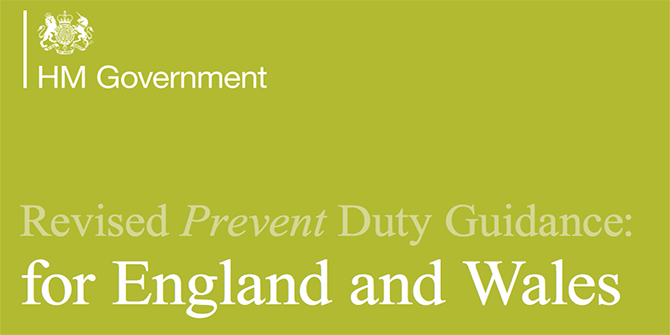A spirited argument has broken out regarding the implications of the Fixed Term Parliaments Act for what kind of government may emerge from the General Election. In another post, Colin Talbot argues that a minority government could govern relatively comfortably given the Act, which makes bringing down a government harder. Sean Swan takes issue with this, and argues that the FTPA is an ‘invitation to adventurism’ and could see a minority government ‘crucified’.
Colin Talbot argues that the Fixed-term Parliaments Act (FTPA) means a minority government would not need a confidence and supply agreement. However, a close reading of the FTPA would indicate that not only does it not strengthen the hand of a minority government, it positively weakens it.
The FTPA “was the consequence of the need to build trust between coalition partners, was agreed in haste and by negotiators who were not especially well versed in the nation’s constitutional arrangements”, as Lord Norton put it. Sir Edward Leigh deemed it a “device to try and maintain the coalition, and stop one part of the coalition ratting on the other”. It weakens the executive by removing the timing of elections from the gift of the PM. Its intended purpose was, in short, to prevent the PM (Cameron) from calling a snap mid-term general election in the hope of obtaining a Conservative overall majority and ditching the Lib Dems. It was a piece of internal coalition business, in other words. But note that the coalition had that most useful thing in parliamentary politics – a majority.
Speaking Legally…
Elections can now come about as a result of one of the following three circumstances:
- Times’s up – at the time appointed in the Act, as is happening now.
- The Commons votes for a dissolution with 2/3rds of the 650 members voting for an early dissolution (or if the motion passes without a division).
- A motion that “That this House has no confidence in Her Majesty’s Government.” Is passed, and within 14 days a motion “That this House has confidence in Her Majesty’s Government.” is not
Talbot insists that “Nothing else forces a Government out of office – not defeat on a Queen’s Speech, a Budget, a key piece of legislation, a vote of no confidence in the Prime Minister, nothing”. This is true – and that is the problem.
Such defeats would hitherto have had two immediate repercussions – the fall of the government and a general election. The FTPA enables the Opposition to defeat the Queen’s Speech or a budget without having to face the traditional consequences of so doing. It is an invitation to adventurism. Prof Talbot asserts that in “reality any minority Government doesn’t need a so-called ‘confidence and supply’ arrangement to be able to govern”. But it rather seems that while such a government might be ’in office’, it most certainly would not be ‘in power’, nor could it ‘govern’.
But it gets worse. It is difficult to see how a government could lose the Queen’s Speech or budget and not then be vulnerable to facing – and losing – a vote of no confidence. But, as Prof Talbot correctly points out, this does not automatically mean a General election. What it does mean is the start of 14 days of haggling. In fact, there is nothing to prevent a government being ‘temporarily’ kicked out, only to be put back in by vote of confidence, for a price, of course, before the expiration of 14 days.
A vote of no confidence can still bring down a government; a government could (arguably) survive losing the budget, but could then hardly be said to be in power. This obviously applies in spades with a minority government. It is thus difficult to see how a minority government would not need a ‘confidence and supply’ deal if it wished to both survive and govern.
Speaking Politically…
But Talbot, and he is very far from being alone in this, rather assumes that a minority Labour government would not really be a minority government. He implies that the SNP would have no choice but to support a Labour minority government even if ‘Labour sticks to its “no deals with the SNP” position’ because ‘they are pledged to “lock out” the Tories and are unlikely to want to force a new General Election”. Supposedly Labour can take the SNP for granted, let’s call this the 1979 argument.
The problem with this is:
- it fails to recognise what is happening in Scotland. If the polls are correct, we are about to witness a transformation in the party political map of one of the three kingdoms without parallel in British politics since Sinn Fein supplanted the Irish Parliamentary Party in the 1918 general election. Even senior Labour figures in Scotland admit that what is happening is a “seismic event”. It is in fact, a small quiet revolution;
- Labour will suffer a devastating defeat in Scotland. That fact should lead to reflection, not a sense of entitlement;
- If the SNP take 75 per cent or more of the seats in Scotland, they can no longer be considered ‘just another party’, they will have become the political manifestation of the Scottish
Is it seriously to be believed that Labour can snub the SNP and still expect them to give unconditional support to Labour? Such a course of action might be read in Scotland as a snub to Scotland, not just to the SNP. According Lord Ashcroft, there are three main reasons former Labour voters in Scotland are turning to the SNP:
- ‘Labour (unlike the SNP) now seem politically indistinguishable from the Conservatives’
- ‘Scottish Labour are […] a “branch office” of the London party’, and
- ‘Labour had disappointed them during the referendum [… by] “backing the Tories”’.
If Labour gets Scotland wrong on this, Scotland might side with the SNP over Labour, and agree that the SNP should not be expected unconditionally to support a party that snubs it. As for the ‘putting in the Tories’ charge, the SNP will not support a Tory government. It might, in extremis, bring about an early election, but that is a different matter. And it might make no difference if a majority in Scotland end up concluding that it really does not matter because ‘blue’ Tories and ‘red’ Tories are ‘all the same’.
But the question of ‘putting the Tories in’ need not arise. If the SNP are snubbed, they can safely vote down the Queen’s speech or a Labour budget, thus making it impossible for Labour to rule (unless by de facto coalition with the Tories, which would open up a whole new can of worms) without bringing down the government or causing an election.
The alternative is for Labour to embrace the SNP as de facto Labour in Scotland, much as the Scottish Unionists were once the Conservatives in Scotland, advance a progressive economic programme and rebuild left/right politics in Britain. This is the choice now facing us – increasing disintegration or class politics. It will be said that this would upset England – wrong, it will only upset Tory England, but there is another England.
Alex Salmond is standing for election to Westminster and may turn up as leader of a 50 strong SNP parliamentary party. The Telegraph warns “Salmond sees himself as a modern version of Charles Stewart Parnell, the Irish nationalist leader who caused parliamentary mayhem in an attempt to break the Union at the end of the 19th century, bringing down two governments in the process”. If the SNP holds the balance of power after the elections and Labour snubs them, we may yet see how the FTPA – a confection created to facilitate a Tory-Lib Dem coalition – could be used to torture a minority government.
Note: This article was originally published on the Democratic Audit blog and gives the views of the author, and not the position of the General Election blog, nor of the London School of Economics. Please read our comments policy before posting.
Sean Swan is a Lecturer in Political Science at Gonzaga University, Washington State.







